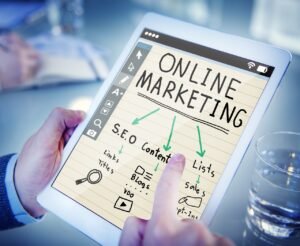Digital marketing refers to the use of digital channels, platforms, and technologies to promote and advertise products, services, or brands. It encompasses a wide range of online marketing activities that leverage the internet and electronic devices to connect with potential customers. Digital marketing aims to reach a target audience through various online channels and engage them in a meaningful way.
Some key components and strategies within digital marketing include:
Search Engine Optimization (SEO): The process of optimizing a website’s content and structure to improve its visibility in search engine results, leading to increased organic (non-paid) traffic.
Search Engine Marketing (SEM): Paid advertising on search engines, such as Google Ads, where advertisers bid on keywords to have their ads displayed in search results.
Social Media Marketing (SMM): Promotion of products or services on social media platforms like Facebook, Instagram, Twitter, LinkedIn, and others to build brand awareness, engage with audiences, and drive traffic.
Content Marketing: Creating and distributing valuable and relevant content to attract and retain a target audience. This includes blog posts, articles, videos, infographics, and more.
Email Marketing: Sending targeted messages and promotional content to a specific audience via email to nurture leads, maintain customer relationships, and encourage conversions.
Affiliate Marketing: Partnering with individuals or other businesses (affiliates) to promote products or services, with the affiliate earning a commission for each sale or lead generated through their marketing efforts.
Influencer Marketing: Collaborating with influencers, individuals with a significant online following, to promote products or services and leverage their credibility and reach.
Online Advertising: Displaying ads on various online platforms, including social media, websites, and mobile apps, to increase brand visibility and drive traffic.
Mobile Marketing: Tailoring marketing strategies for mobile devices, including mobile-optimized websites, apps, and location-based services.
Analytics and Data Analysis: Using tools to track and analyze user behavior, engagement, and campaign performance to make informed decisions and optimize marketing strategies.
Marketing Automation: Using software and tools to automate repetitive marketing tasks, such as email campaigns, social media posting, and customer segmentation, to increase efficiency.
Digital marketing is dynamic and continually evolving as technology advances and consumer behaviors change. It provides businesses with a versatile and measurable way to connect with their target audience, adapt to market trends, and achieve various marketing goals, such as brand awareness, lead generation, and increased sales.
- Specified in Paying ads
- Site Maker
- Multimedia Supporer
- SEO
- EMAIL Marketing
Join us
A small start with your business advisor, supporter and Trainer
We Offer Financial & Superior Services
A small river named Changed Time Online by their place and supplies it with the necessary
regelialia.


